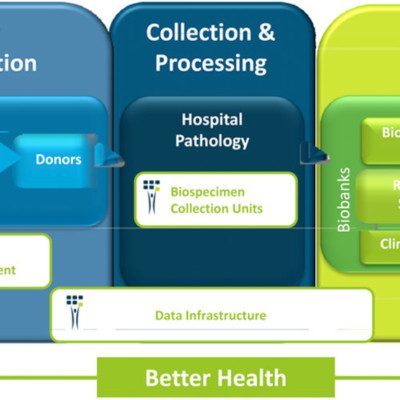Abstract
Medical research to improve health care faces a major problem in the relatively limited availability of adequately annotated and collected biospecimens. This limitation is creating a growing gap between the pace of scientific advances and successful exploitation of this knowledge. Biobanks are an important conduit for transfer of biospecimens (tissues, blood, body fluids) and related health data to research. They have evolved outside of the historical source of tissue biospecimens, clinical pathology archives. Research biobanks have developed advanced standards, protocols, databases, and mechanisms to interface with researchers seeking biospecimens. However, biobanks are often limited in their capacity and ability to ensure quality in the face of increasing demand. Our strategy to enhance both capacity and quality in research biobanking is to create a new framework that repatriates the activity of biospecimen accrual for biobanks to clinical pathology.
The British Columbia (BC) BioLibrary is a framework to maximize the accrual of high-quality, annotated biospecimens into biobanks. The BC BioLibrary design primarily encompasses: 1) specialized biospecimen collection units embedded within clinical pathology and linked to a biospecimen distribution system that serves biobanks; 2) a systematic process to connect potential donors with biobanks, and to connect biobanks with consented biospecimens; and 3) interdisciplinary governance and oversight informed by public opinion.
The BC BioLibrary has been embraced by biobanking leaders and translational researchers throughout BC, across multiple health authorities, institutions, and disciplines. An initial pilot network of three Biospecimen Collection Units has been successfully established. In addition, two public deliberation events have been held to obtain input from the public on the BioLibrary and on issues including consent, collection of biospecimens and governance.
The BC BioLibrary framework addresses common issues for clinical pathology, biobanking, and translational research across multiple institutions and clinical and research domains. We anticipate that our framework will lead to enhanced biospecimen accrual capacity and quality, reduced competition between biobanks, and a transparent process for donors that enhances public trust in biobanking.
